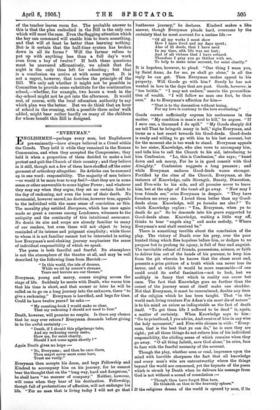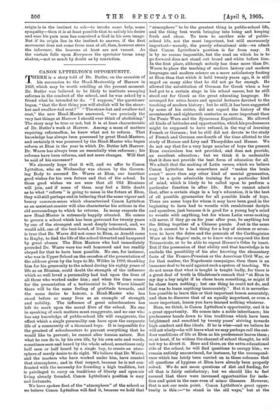protest and quit the Church of their country ; and
they believe in it still, though not a few of them have shuffled off the outer garment of orthodoxy altogether. Its Articles can be summed up in one word: responsibility. The majority of men believe —or would it be more true to say feel ?—that they are in some sense or other answerable to some higher Power ; and whatever they may say when they argue, they set no certain limit to the day of reckoning, not even the hour of their death. No ceremonial, however sacred, no doctrine, however true, appeals to the individual with the same sense of conviction as this. The morality play entitled Everyman, which has once again made so great a success among Londoners, witnesses to the antiquity and the continuity of this intuitional assurance. No doubt its aim and scope are already familiar to many of our readers, but even these will not object to being reminded of its intense and poignant simplicity ; while those to whom it is not familiar cannot but be interested in noting how Everyman's soul-shaking journey emphasises the sense of individual responsibility of which we speak.
The poem is both fanciful and fearful. Its atmosphere is not the atmosphere of the theatre at all, and may be well described by the following lines from Herrick :—
" In this world, the isle of dreams, While we sit by sorrow's streams Tears and terrors are our themes."
Everyman, young and merry, comes singing across the stage of life. Suddenly he meets with Death, who warns him that his time is short, and that sooner or later he will be called on to go on a long journey into the unknown, there "to give a reckoning." Everyman is horrified, and begs for time. Could he have twelve years ? he asks :— " My counting-book I would make so clear,
That my reckoning I should not need to fear."
Death, however, will promise no respite. Is there any chance that he may ever return ? Everyman demands before giving
in to the awful certainty :— "Death, if I should this pilgrimage take,
And my reckoning surely make, Shew me, for saint charity, Should I not come again shortly ? "
Again Death gives no hope :—
"No, Everyman ; and thou be once there, Thou mayst never more come here, Trust me verily."
Everyman then accepts his doom, and begs Fellowship and Kindred to accompany him on his journey, for be cannot bear the thought that on the "long way, bard and dangerous," he shall have "no manner of company." Neither, however, will come when they hear of his destination. Fellowship, though full of protestations of affection, will not endanger his life. "For no man that is living today I will not go that "Of all my works I must show
How I have lived and my days spent ; Also of ill deeds, that I have used In my time, sith life was me lent; And of all virtues that I have refused.
Therefore I pray you go thither with me, To help to make mine account, for saint charity."
It is hopeless, however, to plead. "One thing I warn you, by Saint Anne, As for me, ye shall go alone," is all the reply he can get. Then Everyman makes appeal to his property. Will Goods go with him ? Surely he has not wanted in love in the days that are past. Goods, however, is "too brittle." "I may not endure," asserts the personifica- tion of wealth. "I will follow no man one foot, be thou sure." As to Everyman's affection for him- " That is to thy damnation without lesing,
For my love is contrary to the love everlasting."
Goods cannot sufficiently express his uselessness in the matter. "My condition is man's soul to kill," he argues. "If I save one, a thousand I do spill." "My Goods sharply did me tell That be briugeth . many in hell," sighs Everyman, and turns as a last resort towards his Good-deeds. Good-deeds is ready and willing to go with him to his last account, but for the moment she is too weak to stand. Everyman appeals to her sister, Knowledge, who also vows to accompany him, and tells him to call the Church to his aid, introducing to him Confession. "Lo, this is Confession," she says ; "kneel down and ask mercy, For he is in good conceit with God Almighty." Confession suggests a long penance ; and while Everyman endures Good-deeds waxes stronger. Fortified by the rites of the Church, Everyman, at the instance of Knowledge, calls Strength, Beauty, Discretion, and Five-wits to his side, and all promise never to leave him, but at the edge of the tomb all go away. "Now may I true friends see," cries Everyman in despair. " They have forsaken me every one. I loved them better than my Good- deeds alone. Knowledge, will ye forsake me also P" To which Knowledge replies : "Yea, Everyman, when ye to death do go." So he descends into his grave supported by Good-deeds alone. Knowledge, waiting a little way off, thinks to hear "angels sing" and make melody, "Where Everyman's soul shall received be."
There is something terrible about the conclusion of the play. The victory of Death over his prey, over the poor hunted thing which flies hopeless before him, or dodges to no purpose but to prolong its agony, is full of fear and anguish. The inevitable refusal.of friends, possessions, science, or faith to deliver him out of the hands of his pursuer, to keep him from the pit wherein he knows that the chase must end, presents a grim picture of a truth which can never lose its terror, and at which it would be more reasonable—if one
could avoid its awful fascination—not to look, lest we multiply in fancy that which in reality can occur but once. The fact that Knowledge goes no further than the
outset of the journey must of itself make one shudder. Not that Everyman, it must be remembered, doubts any item
of the religion which he has been taught. That "in the world each living creature For Adam's sin must die of nature" is to his mind an axiom as indisputable as the fact of death itself. "To get them life I suffered to be dead" is, again, a matter of certainty. When Knowledge says to him : "Go to priesthood, I you advise, And receive of him in any wise the holy sacrament," and Five-wits chimes in with : "Every- man, that is the best that ye can do," he is sure they are right; yet all these things do not relieve him of his individual responsibility, the abiding sense of which remains when they go away. "0 all thing failetb, save God alone," he cries, face to face with the fearful necessity of the account.
Though the play, whether seen or read, impresses upon the mind with horrible sharpness the fact that all knowledge and every man's wits are untrustworthy where the things
beyond the world are concerned, yet the keynote of the poem which is struck by Death when he delivers his message from God is not without a sound of consolation :— " Though thou have forget Him here,
He thinketh on thee in the heavenly sphere."
If the religious drama of the world is opened by man, if its , origin is in the instinct to ask—to invoke some help, some sympathy—then it is at least possible that to satisfy his desire and ease his pain man has conceived a God in his own image. But if its origin lies in the instinct to answer, if the first movement does not come from man at all, then, however stern the inference, the heavens at least are not vacant. As the curtain falls upon Everyman the spectator turns away shaken,—not so much by doubt as by conviction.











































 Previous page
Previous page